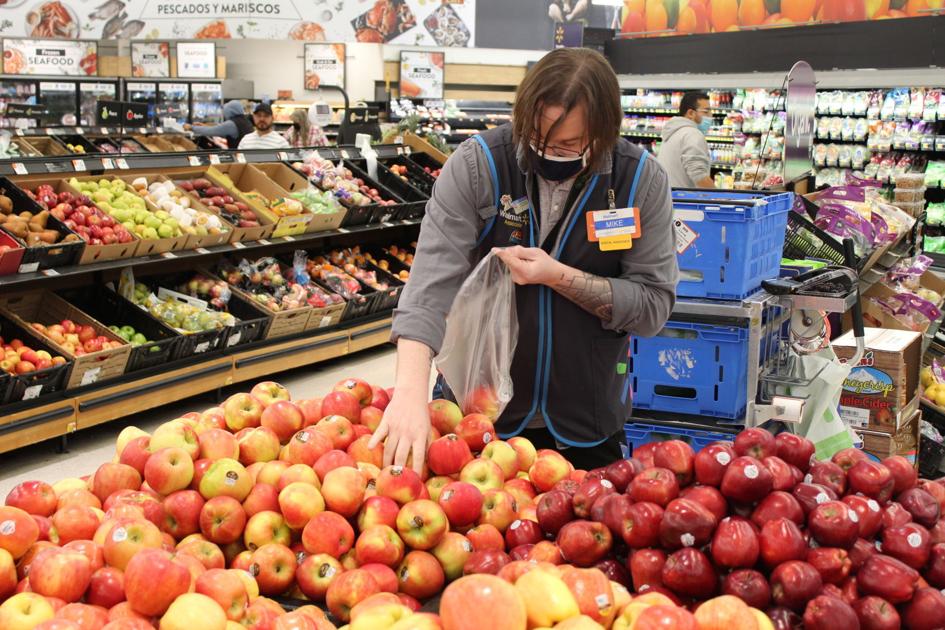
Manufacturing jobs in the Yakima Valley could see a huge boost by 2031 if a goal set by the Legislature is achieved over the next decade.
The Association of Washington Businesses concluded its six-day statewide bus tour Friday afternoon with stops at the Rainier Fruit Co. in Selah and the Walmart on East Yakima Avenue.
At first glance, those two business entities seem quite different, but a Walmart initiative to sell more local produce in its stores could boost the amount of apples, pears, cherries and blueberries the Selah wholesaler ships out.
Walmart, which has a distribution center in Grandview and 66 stores across Washington, spends $2.8 billion each year with Washington suppliers, said Deborah Herron, regional director of government affairs for the company.
“We have a $350 billion initiative to source more products that are made and grown in the U.S.,” Herron said during Friday’s tour stop in Yakima. “That ranges from produce, beer and wine from the Yakima Valley to towels and high-tech products.”
AWB President Kris Johnson hopes many of those retail items will be manufactured and grown in Washington.
This year’s bus tour celebrated the 305,000 people who work in the state’s manufacturing sector, with 8,573 of those jobs in Yakima County, according to 2020 statistics.
There are 267 manufacturing businesses in the county from various industries, including agriculture and technology, with an average annual wage of $50,400, Johnson said.
“We’re the most trade-driven state among the 50 states,” he added.
Johnson touted the Washington BEST Manufacturing Act, passed unanimously by the Legislature earlier this year, which calls for doubling the state’s manufacturing jobs and doubling the number of small manufacturing businesses by 2031.
Meeting that goal will require investment in training and education for the state’s workforce, infrastructure improvements and protecting Washington’s low-cost energy supply, which Johnson said is one of our state’s top competitive advantages for manufacturers.
Demographic challenges, with many baby boomer-age workers retiring, combined with the shutdowns and restrictions of the COVID-19 pandemic, disrupted the supply chain of both goods and workers, Johnson said.
“We knew going into the pandemic that finding skilled, educated workers was a challenge,” he said. “It’s only been magnified by the pandemic.”
In addition to workforce training, the AWB conducted a manufacturing and technology study in March. Among other areas, the study looked at how the “agri-tech” industry in Washington has helped the growing, packaging and processing of fruits and vegetables.
“For example, the fruit orchards use trellis support systems in each row for fruit-laden trees,” the study noted. “Most orchards use automated irrigation systems, while machines are used to combat frost or freezing temperatures.
“Plastic covers are used over orchards to limit damage from sunburn, insects, birds and other damaging factors.”
The AWB study also found that the agri-tech sector has become a growing source of innovation and attracted more venture capital to Washington businesses.
“Through August 200, global venture investments in the agri-tech sector reached $2.6 billion, potentially on pace to exceed the $4 billion in investments in 2019,” the study concluded.
"fruit" - Google News
October 10, 2021 at 09:30PM
https://ift.tt/3lqYY11
Business group visits Selah fruit company, Yakima Walmart on statewide tour - Yakima Herald-Republic
"fruit" - Google News
https://ift.tt/2pWUrc9
https://ift.tt/3aVawBg
Bagikan Berita Ini














0 Response to "Business group visits Selah fruit company, Yakima Walmart on statewide tour - Yakima Herald-Republic"
Post a Comment